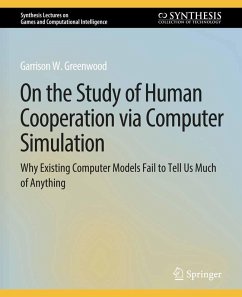Over the past 25 years, countless papers on social dilemma games have been published, yet arguably little progress has been made. The problem is the social dilemma game models are unrealistic in the sense they contain artificial constructs that deviate from the way humans act. This book describes the shortcomings in current social dilemma game modeling techniques and provides guidance on designing more effective models. A basic introduction to game theory is provided with an emphasis on the prisoner's dilemma, the most widely studied social dilemma game. Individual chapters are provided detailing the shortcomings of weak selection, spatial games, and the Moran process. Computer model validation is also discussed at length. The recommendations found in this book should help design more realistic social dilemma game models likely to produce a better understanding of human cooperation.
Dieser Download kann aus rechtlichen Gründen nur mit Rechnungsadresse in A, B, BG, CY, CZ, D, DK, EW, E, FIN, F, GR, HR, H, IRL, I, LT, L, LR, M, NL, PL, P, R, S, SLO, SK ausgeliefert werden.









